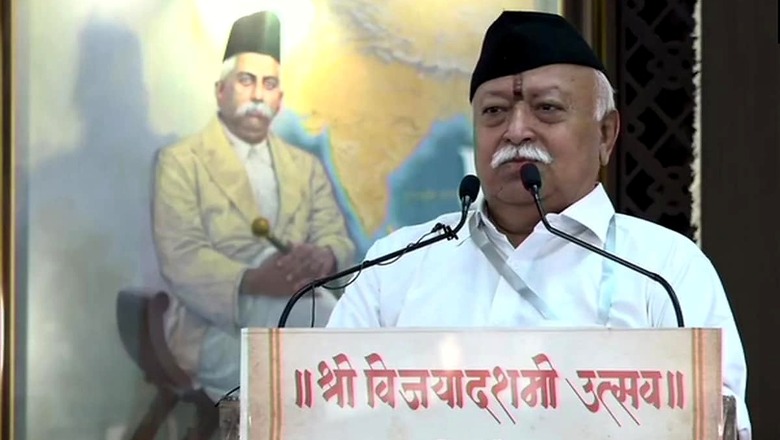
views
Rashtriya Swayamsevak Sangh (RSS) chief Mohan Rao Bhagwat’s Dussehra speech on Sunday, delivered on the eve of the Bihar elections, was met with cheer and some relief by the BJP. He not only praised the NDA’s response to the dual challenges of coronavirus and China, but sought to wrong-foot the Opposition by inveighing against ‘divisive’ forces masquerading as ‘champions of secularism’.
From the BJP’s perspective, the underlying political current of the speech and the function itself were both unexceptionable. Only 50 persons attended and social distancing was visibly maintained. And nothing that could spook Bihar’s voters was said (unlike 2015, when his remark on rationalising quotas put the BJP on the defensive). Quite the reverse.
Bhagwat predictably valorised India’s tough handling of the Chinese threat on the Ladakh border. The armed forces’ resolute and brave stand, he hinted, was a departure from a hitherto ‘weak’ response. It came as a surprise to China and an example to the rest of the world, which is now well aware that India is no longer a pushover.
His implication being that the NDA government has demonstrated its capability both in dealing with the ever-present menace at the border and in diplomacy aimed at shoring up a united front (both global and regional) against Chinese aggression. Thus, given that a cornered China might retaliate in unpredictable ways, citizens can repose their faith in the current dispensation.
Another notable theme of the address, liberally interspersed with quotes and phrases in English, was the threat to internal security from the unhappy convergence of political and extremist forces – the so-called “tuke tukde gang”. This, he said, was blatantly obvious during the campaign against the Citizenship Amendment Act (CAA).
Bhagwat strongly condemned the opposition to the CAA, which he maintained was patently aimed at including (new citizens) and not excluding (existing ones). He observed that while the abrogation of Article 370 related to Jammu and Kashmir and the Ram Janambhoomi verdict were met with peaceful restraint and good sense, the CAA triggered an atmosphere of tension.
In a clear broadside against centre-left parties, he said that politico-extremist forces masquerading as protectors of secularism had sought to embrace the “grammar of anarchy” by dividing society, instigating violence and undermining national unity, instead of taking the democratic path.
Bhagwat asserted that promoting separatism, while spreading rumours against ‘hindutva’, was the modus operandi of these forces. He drew a stark contrast between their egotism and identity politics and the Sangh’s commitment to “emotional integration”, pluralism and mutual tolerance.
The economic, social and political impact of the Covid-19 pandemic naturally informed a considerable portion of Bhagwat’s address. The “mahamari”, he observed, had suppressed if not eliminated the negativity of the preceding months.
He made it a point to heap unstinted praise on the frontline health and sanitation workers. The latter, it may be pointed out, are traditionally drawn from the most disadvantaged communities. In an oblique reference to the lockdown, he said the administrative response may have seemed a tad over-the-top, but inculcated a necessary sense of caution.
Bhagwat skimmed over the migrant crisis by celebrating the great Indian spirit of self-reliance and community bonding, which had come to the fore during the pandemic. The society had pulled together and the principle of “thy need is greater” was adopted, with the afflicted aiding those who were even worse off, all of which fostered a spirit of unity and was a testimony to India’s “social capital”.
The sarsanghchalak also took the opportunity to advocate the ‘Atmanirbhar Bharat’ policy while not referring to it directly. The pandemic had shown that globalisation without self-reliance was not viable for any nation. While foreign investment and technology is welcome, it should be on India’s terms, he said.
He pointed out that the pandemic had showcased the advantages of swadeshi in every sphere: self-reliance for farmers in seeds and other farm inputs, a cleaner environment, less conspicuous consumption. He also acknowledged the need for protecting farmers and small-scale industries, re-skilling workers and job-creation in the wake of the pandemic. All of this was possible in the current circumstances, he observed.
All in all, in summing up the turbulent events of the last one year, he managed to give the ruling dispensation a good report card. Whether Bihar’s voters will take note remains to be seen.
Read all the Latest News and Breaking News here

















Comments
0 comment